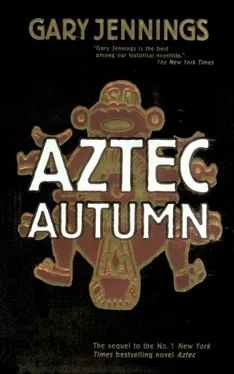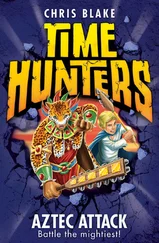Gary Jennings - Aztec Autumn
Здесь есть возможность читать онлайн «Gary Jennings - Aztec Autumn» весь текст электронной книги совершенно бесплатно (целиком полную версию без сокращений). В некоторых случаях можно слушать аудио, скачать через торрент в формате fb2 и присутствует краткое содержание. Жанр: Старинная литература, на английском языке. Описание произведения, (предисловие) а так же отзывы посетителей доступны на портале библиотеки ЛибКат.
- Название:Aztec Autumn
- Автор:
- Жанр:
- Год:неизвестен
- ISBN:нет данных
- Рейтинг книги:4 / 5. Голосов: 1
-
Избранное:Добавить в избранное
- Отзывы:
-
Ваша оценка:
- 80
- 1
- 2
- 3
- 4
- 5
Aztec Autumn: краткое содержание, описание и аннотация
Предлагаем к чтению аннотацию, описание, краткое содержание или предисловие (зависит от того, что написал сам автор книги «Aztec Autumn»). Если вы не нашли необходимую информацию о книге — напишите в комментариях, мы постараемся отыскать её.
Readers familiar with Mexican history will welcome the rich details of this vengeance drama; those new to it will be impressed by Jennings's exhaustive research.
Aztec Autumn — читать онлайн бесплатно полную книгу (весь текст) целиком
Ниже представлен текст книги, разбитый по страницам. Система сохранения места последней прочитанной страницы, позволяет с удобством читать онлайн бесплатно книгу «Aztec Autumn», без необходимости каждый раз заново искать на чём Вы остановились. Поставьте закладку, и сможете в любой момент перейти на страницу, на которой закончили чтение.
Интервал:
Закладка:
"Because the nuns were so cruel, first to my mother, then to me."
"Explain."
"After her Church schooling, when my mother had had sufficient instruction in that religion, and had attained the age required, she was confirmed as a Christian and immediately took what they call holy orders—became a bride of Christ, as they say—and took residence in the convent as a novice nun. However, not many months later, it was discovered that she was pregnant. She was stripped of her habit and viciously whipped and evicted in disgrace. As I have said, she never told even me who it was that made her pregnant." You added bitterly, "I doubt that it was her husband Christ."
I pondered awhile, then asked, "Might your mother's name have been Rebeca?"
"Yes," you said, astonished. "How could you possibly know that, my lord?"
"I briefly attended that same Church school, so I know—some little—of her story. But I left the city about that time, so I never knew the whole story. After Rebeca's eviction, what became of her?"
"Bearing a fatherless bastard inside her, I daresay she was ashamed to go home to her own mother and father—her white patrón. For a time, she earned a precarious living, doing menial odd jobs about the markets, literally living on the streets. I was birthed on a bed of rags in some alley somewhere. I suppose I am fortunate to have survived the experience."
"And then?"
"Now she had two mouths to feed. I blush to say it, my lord, but she went—what you call in your language 'astraddle the road.' And, she being a mulata—well, you can imagine—she could hardly solicit rich Spanish nobles or even prosperous pochtéca merchants. Only market porters and Moro slaves and the like—entertaining them in squalid little inns and even in back streets outdoors. Toward the end—I could not have been more than four years old—I remember having to watch her do these things."
"Toward the end. What was the end?"
"Again I blush, my lord. From some one of her straddlings, she contracted the nanáua, the disease of uttermost shame and revulsion. When she knew she was dying, she went again to the convent, leading me by the hand. Under the rules of that Christian order, the nuns could not refuse to take me in. But of course they knew my history, so I was despised by all, and I had no hope of being accorded a novitiate. They simply used me as a servant, a slave, a drudge. Of all the work that needed doing, I did the lowliest, but at least they gave me bed and board."
"And education?"
"As I have told you, my mother had imparted to me much of the knowledge that she herself had earlier acquired. And I have some facility at being observant and attentive. So, even while I labored, I watched and listened and absorbed what the nuns were teaching their novices and other respectable young girls in residence there. When finally I decided I had learned all that they could, however viciously, teach me there... and when the drudgery and beatings had become intolerable... that was when I ran away."
"You are one supremely remarkable girl, Verónica. I am immeasurably glad that you survived your wanderings and came at last to—to us."
I pondered some more. How best to say this?
"From what little acquaintance I had with my schoolmate Rebeca, I believe it was her mother who gave you your white blood, and her father would have been a Moro, not some Spanish patrón. But that does not matter. What matters is that your father—whoever he was—I believe to have been an indio, a Mexícatl or Aztécatl. Thus you have three bloods in your veins, Verónica. That combination, I suppose, accounts for your uncommon comeliness. Now, mind you, I can only surmise the rest from the few hints dropped by Rebeca. But, if I am right, your paternal grandfather was a high noble of the Mexíca, a man brave and wise and truly noble in all respects. A man who defied the Spanish conquerors to the very end of his life. His contribution to your nature would account for your uncommon intelligence, and especially your astounding facility with words and writing. If I am right, that grandfather of yours was a Mexícatl named Mixtli—more properly Mixtzin— Lord Mixtli."
XXXI
Our army's progress across the countryside was even slower now than before, because of our having to herd along the stupid, stubborn, shambling, recalcitrant cattle. Because my warriors were becoming understandably restive—I having turned them from warriors into mere escorts and herdsmen—I halted the army once along the way to give them an opportunity for bloodshed, raping and looting.
That was at what had formerly been the Otomí people's chief village, named N't Tahí, but was now a town of estimable size, populated almost entirely by Spaniards and their usual retinues of servants and slaves, and renamed by them Zelalla. We left it as scorched and ruined and leveled as Tonalá, most of the leveling having been done by the Purémpe women's granadas. And we left it unpopulated, except by corpses— hairless corpses, courtesy of the Yaki.
I am gratified to report that my warriors departed from Zelalla with much more dignity and much less flamboyance than when they had departed from Tonalá—that is, not bedecked and bedizened in Spanish skirts and bonnets and mantillas and such. Indeed, for some while now, they had been getting ashamed—even the women and the most ignorant Moros—of all those gauds and baubles and steel breastplates. Besides their increasing embarrassment at wearing such unwarriorlike garb, they found the clothes dangerously constrictive in battle, and uncomfortably heavy even to march in, especially when sodden by rain. So all had been shedding those white men's garments and ornaments, piece by piece, along the way—everything except the warm woolens usable as blankets and mantles—and we again looked like the true indio army that we were.
In time, an excruciatingly long time, we did reach those Mountains Where the Cuguars Lurk, and they were exactly as Knight Pixqui had described them. With him in the lead, we wove our tortuous way through a maze of those narrow ravines, some only wide enough for a single horseman (or cow) to pass through, one after another. And eventually we did emerge into a not broad but lengthy valley, well watered, spacious enough for us all to camp comfortably, and even sufficiently green to provide grazing for our animals.
When we had settled down and gratefully rested for two or three days, I summoned to me the Iyac Pozonáli and my darling scribe Verónica, and told them:
"I have a mission for you two. I think it will not be a hazardous mission, though it will entail arduous travel. However"—I smiled—"I think also that you will not mind a long journey in close company with one another." You blushed, Verónica, and so did Pozonáli.
I went on, "It is certain that everyone in the City of Mexíco, from the Viceroy Mendoza down to the least market slave, knows of our insurrection and our depredations. But I should like to know how much they know of us, and what measures they may be taking to defend the city against us or to sally out and find and fight us in the open. What I want you to do is this. Go on horseback as fast and as far southeastward as you can, stopping only when you decide you are getting perilously close to any possible Spanish outposts. By my reckoning, that will probably be somewhere in the eastern part of Michihuácan, where it borders on the Mexíca lands. Leave the horses with any hospitable native who can tend them. From there, go on foot and dressed in the roughest of peasant garb. Take with you bags of some kind of marketable goods—fruits, vegetables, whatever you can procure. You may find the city solidly ringed about with sharp steel, but it must let supplies and commodities in and out. And I think the guards will hardly be suspicious of a young peasant farmer and—shall we say?—his little cousin, headed for the market."
Читать дальшеИнтервал:
Закладка:
Похожие книги на «Aztec Autumn»
Представляем Вашему вниманию похожие книги на «Aztec Autumn» списком для выбора. Мы отобрали схожую по названию и смыслу литературу в надежде предоставить читателям больше вариантов отыскать новые, интересные, ещё непрочитанные произведения.
Обсуждение, отзывы о книге «Aztec Autumn» и просто собственные мнения читателей. Оставьте ваши комментарии, напишите, что Вы думаете о произведении, его смысле или главных героях. Укажите что конкретно понравилось, а что нет, и почему Вы так считаете.











